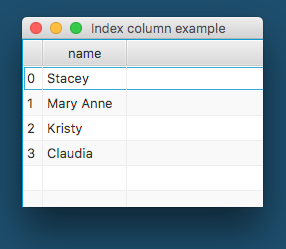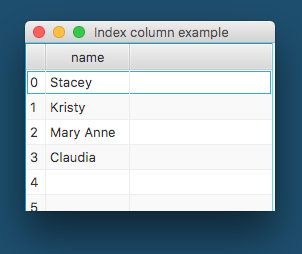Sample Solution
Here's a solution using a cell factory:
TableColumn numberCol = new TableColumn("#");
numberCol.setCellValueFactory(new Callback<CellDataFeatures<Person, Person>, ObservableValue<Person>>() {
@Override public ObservableValue<Person> call(CellDataFeatures<Person, Person> p) {
return new ReadOnlyObjectWrapper(p.getValue());
}
});
numberCol.setCellFactory(new Callback<TableColumn<Person, Person>, TableCell<Person, Person>>() {
@Override public TableCell<Person, Person> call(TableColumn<Person, Person> param) {
return new TableCell<Person, Person>() {
@Override protected void updateItem(Person item, boolean empty) {
super.updateItem(item, empty);
if (this.getTableRow() != null && item != null) {
setText(this.getTableRow().getIndex()+"");
} else {
setText("");
}
}
};
}
});
numberCol.setSortable(false);
Simple Alternate Solution
And a simpler sample using a cell value factory and no cell factory for the normal case where all of the items in the backing data list for the table are unique and their index can be looked up via table.getItems().indexOf(p.getValue()):
TableColumn numberCol = new TableColumn("#");
numberCol.setCellValueFactory(new Callback<CellDataFeatures<Person, String>, ObservableValue<String>>() {
@Override public ObservableValue<String> call(CellDataFeatures<Person, String> p) {
return new ReadOnlyObjectWrapper(table.getItems().indexOf(p.getValue()) + "");
}
});
numberCol.setSortable(false);
Why your attempt to do this failed
I couldn't say exactly why your attempt to do this failed as I don't think there is enough code in your question to accurately diagnose the failure. My guess is that you didn't provide a cell value factory for the row and also setting the text in the cell's constructor rather than an updateItem call caused it not to work.
Executable Sample
Here is an executable sample:
![tableviewnumberedrows]()
import javafx.application.Application;
import javafx.beans.property.ReadOnlyObjectWrapper;
import javafx.beans.property.SimpleStringProperty;
import javafx.beans.value.ObservableValue;
import javafx.collections.FXCollections;
import javafx.collections.ObservableList;
import javafx.geometry.Insets;
import javafx.scene.Group;
import javafx.scene.Scene;
import javafx.scene.control.Label;
import javafx.scene.control.TableCell;
import javafx.scene.control.TableColumn;
import javafx.scene.control.TableColumn.CellDataFeatures;
import javafx.scene.control.TableView;
import javafx.scene.control.cell.PropertyValueFactory;
import javafx.scene.layout.VBox;
import javafx.scene.text.Font;
import javafx.stage.Stage;
import javafx.util.Callback;
public class NumberedTableViewSample extends Application {
private TableView<Person> table = new TableView<Person>();
private final ObservableList<Person> data =
FXCollections.observableArrayList(
new Person("Jacob", "Smith", "[email protected]"),
new Person("Isabella", "Johnson", "[email protected]"),
new Person("Ethan", "Williams", "[email protected]"),
new Person("Emma", "Jones", "[email protected]"),
new Person("Michael", "Brown", "[email protected]")
);
public static void main(String[] args) {
launch(args);
}
@Override
public void start(Stage stage) {
Scene scene = new Scene(new Group());
stage.setTitle("Table View Sample");
stage.setWidth(470);
stage.setHeight(500);
final Label label = new Label("Address Book");
label.setFont(new Font("Arial", 20));
table.setEditable(true);
TableColumn numberCol = new TableColumn("#");
numberCol.setMinWidth(20);
numberCol.setCellValueFactory(new Callback<CellDataFeatures<Person, Person>, ObservableValue<Person>>() {
@Override public ObservableValue<Person> call(CellDataFeatures<Person, Person> p) {
return new ReadOnlyObjectWrapper(p.getValue());
}
});
numberCol.setCellFactory(new Callback<TableColumn<Person, Person>, TableCell<Person, Person>>() {
@Override public TableCell<Person, Person> call(TableColumn<Person, Person> param) {
return new TableCell<Person, Person>() {
@Override protected void updateItem(Person item, boolean empty) {
super.updateItem(item, empty);
if (this.getTableRow() != null && item != null) {
setText(this.getTableRow().getIndex()+"");
} else {
setText("");
}
}
};
}
});
numberCol.setSortable(false);
TableColumn firstNameCol = new TableColumn("First Name");
firstNameCol.setMinWidth(100);
firstNameCol.setCellValueFactory(
new PropertyValueFactory<Person, String>("firstName"));
TableColumn lastNameCol = new TableColumn("Last Name");
lastNameCol.setMinWidth(100);
lastNameCol.setCellValueFactory(
new PropertyValueFactory<Person, String>("lastName"));
TableColumn emailCol = new TableColumn("Email");
emailCol.setMinWidth(200);
emailCol.setCellValueFactory(
new PropertyValueFactory<Person, String>("email"));
table.setItems(data);
table.getColumns().addAll(numberCol, firstNameCol, lastNameCol, emailCol);
final VBox vbox = new VBox();
vbox.setSpacing(5);
vbox.setPadding(new Insets(10, 0, 0, 10));
vbox.getChildren().addAll(label, table);
((Group) scene.getRoot()).getChildren().addAll(vbox);
stage.setScene(scene);
stage.show();
}
public static class Person {
private final SimpleStringProperty firstName;
private final SimpleStringProperty lastName;
private final SimpleStringProperty email;
private Person(String fName, String lName, String email) {
this.firstName = new SimpleStringProperty(fName);
this.lastName = new SimpleStringProperty(lName);
this.email = new SimpleStringProperty(email);
}
public String getFirstName() {
return firstName.get();
}
public void setFirstName(String fName) {
firstName.set(fName);
}
public String getLastName() {
return lastName.get();
}
public void setLastName(String fName) {
lastName.set(fName);
}
public String getEmail() {
return email.get();
}
public void setEmail(String fName) {
email.set(fName);
}
}
}



